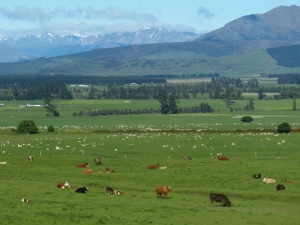The "once in a lifetime opportunity to spend a week with other like-minded farmers and world class presenters" was the impetus for farmer Blair Drysdale to apply for the Rabobank Farm Managers Program.
A graduate of last year's programme, Blair says he "can't fully quantify the benefits" of building an extensive network of farmers from across New Zealand and Australia, some who he says will be "friends for life".
The Farm Managers Program – developed specifically for up-and-coming farmers to enhance their commercial management skills – covers topics including global trends in agriculture, business planning, financial management, leadership and succession planning. Applications to join the 2016 program have just opened.
Blair and his wife Jody, took over the family farming business near Balfour in Northern Southland in 2009, and have transformed the predominately sheep operation into a diverse enterprise consisting of cereals (wheat, barley, oats and peas), grazing dairy heifers and cows, sheep and beef cattle, with land also leased out annually for tulips.
"Our diversity has helped spread our risk," he says. "And by not having a fixed system or rotation, we have flexibility and take a forward-looking approach by adapting our enterprise mix in line with the medium-term commodity outlook. For example, this season we are increasing our beef herd slightly and reducing our cereal acreage due to the current state of the markets."
Announcing the opening of applications for the 2016 Farm Managers Program, which will be held in Australia in the iconic Barossa Valley in June, Rabobank general manager Country Banking New Zealand Hayley Moynihan said the program was now considered a "must" for young farmers wanting to be at the forefront of agricultural trends and business management.
"In the increasingly complex environment in which farmers now operate, this program is perhaps more important than ever, as it equips them with the fundamentals of good business management to solidify and grow their businesses," she says.
"And by developing these skills early in their career, younger farmers are able to think more strategically, manage risks and develop their people skills and capability – which are important when running any business or stepping into managerial positions."
Blair says, while all the program topics were beneficial and could be practically applied back into his business, he took the most away from the financial management session.
"While preparing budgets has always been an important component of our business, I now have a new skill set to analyse the financial performance of our business by benchmarking our return on equity and capital ratios, so that we truly understand our position and can make improvements," he says.
Since returning home from the program, Blair has undertaken a scenario analysis around nutrient management and input use on his family's farming enterprise. This has formed the basis of his Management Project, a post-course exercise which gives graduates of the Farm Managers Program the framework to put into practice and develop the skills, tools and ideas they took away from the course.
"By conducting a more rigorous soil testing program before and after every crop, my project aims to determine the optimal rate of fertiliser that we can apply to our crops to achieve desired yields while also meeting increasingly demanding environmental standards," he says.
"By reducing our nutrient use, this will not only provide a cost benefit back to the business but also an environmental benefit."
The sessions around farm succession and people management were also pertinent to his business, Blair says.
"Even though we have already been through succession with my parents, the programme highlighted that succession is a never-ending process and that Jody and I should give more thought to our own succession – even though our children are still very young," he says.
"I also took a lot away from the feedback on my management style, which was obtained via a survey that our staff and contractors completed prior to the program.
"It was also really interesting to hear how others on the program manage their staff – as their approaches were all so diverse."
Blair says while he had a lot in common with everyone in the room, "it was hard to comprehend the scale of some of the operations – particularly in Australia" and how conversely, "many of the Australian producers were amazed by how much farmers could produce off their acreages here in New Zealand".
Applications for the 2016 Rabobank Farm Managers Program are open until April 15. The programme will run from June 5 to 10 at the Novotel, Barossa Valley, South Australia, with 36 spaces available for farmers from New Zealand and Australia.
Producers interested in an application form or any further information on the Rabobank Farm Managers Program should visit www.rabobank.co.nz/bmp or contact Rabobank business programs manager Nerida Sweetapple on +61 2 6363 5910 or email This email address is being protected from spambots. You need JavaScript enabled to view it.



















